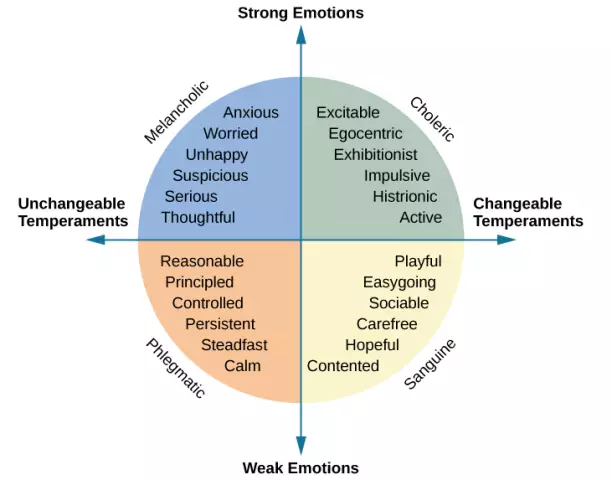- Author Rachel Wainwright wainwright@abchealthonline.com.
- Public 2023-12-15 07:39.
- Last modified 2025-11-02 20:14.
Temperament and character

Experts call temperament a set of individual dynamic characteristics of behavior, which serves as the basis for the development and formation of character. Thus, in psychology, temperament and character are seen as complementary phenomena that also have a strong influence on each other. Of course, it is a mistake to believe that these concepts are synonymous, but at the same time their close relationship is obvious.
Temperament and character: main differences
If expressed in accessible language, it is customary to call character features of a person's behavior that affect communication with him, and temperament is the features of the manifestation of this behavior, the strength and brightness of the emotional response. At the same time, it should be said that temperament is rather the individual properties of the human psyche, which determine the mental activity of a person.
So, by temperament is meant the totality of the innate properties of a person, and by character - the generalization of qualities acquired during life. Temperament and character in psychology are also divided by definition: temperament is determined by various biological characteristics of a person, while character is determined, first of all, by the social environment in which he exists and develops.
Thus, it can be generalized that in different social conditions people have different character traits, which cannot be said about temperament: it, as a rule, remains unchanged in any conditions. Also, character is not least due to upbringing and culture, while the individual characteristics of the nervous system have a huge influence on temperament.
In addition, character traits are measurable, and properties of a certain type of temperament are not evaluated. That is, to say that a person has a good or bad character is quite possible, but such a characteristic is not applicable to temperament. That is why, in psychology, temperament and character, although they usually appear together, can sometimes be considered apart from each other.
The relationship of character and temperament: basic provisions
To identify the relationship between character and temperament, it is necessary to consider the types of the latter:
- Sanguine;
- Phlegmatic person;
- Choleric;
- Melancholic.
A sanguine person is a type of temperament characterized by mobility and sociability. He reacts vividly to any events and tolerates various troubles and failures relatively easily. People of this type have very lively facial expressions, they are quite emotional, but their emotions replace each other too quickly. That is why sanguine people are often credited with inconstancy and superficiality.
The properties of the temperament and character of a person belonging to the type of choleric can often be characterized as constant impetuosity and passion. He is susceptible to sudden and frequent mood swings and violent emotional outbursts. Additional properties include imbalance, emotionality, increased excitability, and often irritability and aggression.
Phlegmatic people are distinguished by relative constancy both in their convictions and aspirations, and in their mood. It is very difficult for such a person to lose his temper or find out what is happening inside him: they have practically no external expressions of emotional experiences. The main properties of this type can be called calmness, restraint, sometimes laziness and indifference to surrounding events and people.
The temperament and character of the melancholic are distinguished by hypersensitivity, vulnerability and impressionability. People of this type experience any minor setbacks for a very long time and painfully, they often have problems with self-esteem and an inferiority complex. This type, as a rule, is prone to anxiety and isolation.
As you can see, the temperament and character of a person are closely related, however, as noted above, it is the temperament that determines the dynamic features of the manifestation of character. This means that such a trait of him as, for example, sociability in a phlegmatic person and a sanguine person will have different manifestations.
In addition, temperament can both strongly influence the development of certain character traits and hinder it in specific cases. Also, some features of a person's character can restrain the manifestation of temperament properties in various situations.
Character traits and temperament
It is a mistake to believe that character traits and temperament constitute a single whole and that specific features can be used to judge the type of temperament. Rather, the latter simply affects the manifestation of some of the features of the former.

So, all 4 types may have such a character trait as hard work, but it will be expressed in all of them in different ways:
- A sanguine person will take the initiative, take on new projects, easily experience troubles, quickly forget about them and again get carried away with a new business;
- The choleric will devote himself to work with the passion typical of his type, but he will be annoyed over trifles, then again inspired and again angry, reaching the point of real aggression;
- A phlegmatic person will prefer to calmly focus on the matter, thoroughly grasp its essence, ponder and calculate all the nuances. Moreover, outwardly it may seem that he is by no means interested in his work. But in fact, he simply does not like to rush: this is how his concentration and poise are manifested;
- The character traits and temperament of the melancholic in this case will lead to the fact that he will think about his task for days and nights, work hard, but at the same time reproach himself for the slightest mistakes. This type is inclined to see possible mistakes and failures in any business, which he is terribly afraid of, due to his natural suspiciousness.
Thus, the relationship between character and temperament is not a given. Moreover, experts note: a clear type of sanguine, choleric, phlegmatic or melancholic with its characteristic properties can rarely be found in real life. Most often people have a mixed type of temperament, that is, they have inherent properties that are endowed with different types. Of course, the advantage of one type over others is not excluded, due to which a person, as a rule, refers to a particular one.
Found a mistake in the text? Select it and press Ctrl + Enter.






